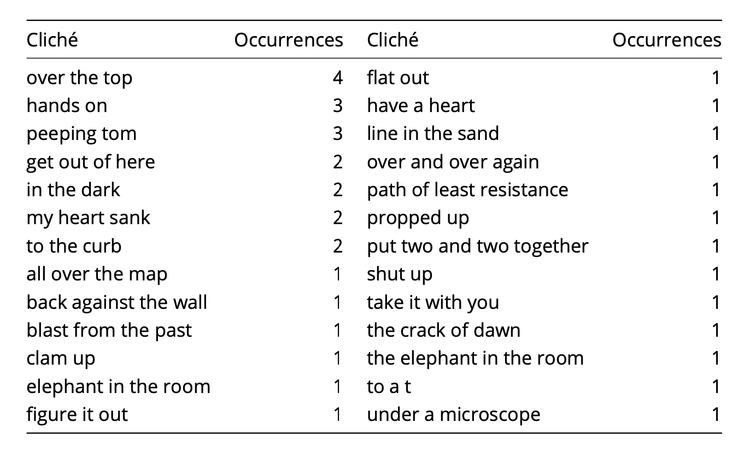Bad Words in Your Books
ALESSANDRA TORRE, NYT BESTSELLING AUTHOR
As writers, our words are the building blocks and material of our novels – so we have to choose them carefully! The word choices you make create the flavor and tone of your book, and as important as having impactful strong words are, it is just as important to avoid “bad words” in your novel.
No, no… not THOSE kind of bad words, though you should make sure that any four-letter words are used with purpose and moderation. But let’s talk about a few other types of bad words to avoid in your writing.
To help aid in these explanations and bad word hunting – I’ll be using examples from a Marlowe Pro report. Marlowe is an artificial intelligence that can analyze a manuscript and provide helpful feedback. If you’d like to try her out on your latest novel, just use INKERSTRY to get a comped Single Pro Report at authors.ai.
Okay, let’s dive into the first type of Bad Words…
Bad Word #1: The Dreaded Cliché
Clichés are phrases that have been overused to the point where they become weak and lose their impact. Clichés can stand out like sore thumbs (eek! there’s a cliché right there) to readers and take them out of the natural flow of a scene.
You don’t have to remove EVERY cliché from your writing – they are often naturally used in dialogue, but you should keep an eye out for them and remove them or replace them with stronger wording, if possible.
Confused on whether you’re using clichés? Here’s the cliché report from my Marlowe Pro report on The Good Lie:

Looking over my list of clichés, I definitely see some that need to be removed, and some that might be okay if used once, but that should certainly not be showing up multiple times.
Take a look at your novel and see where you can trim the fat (ouch! another one!) or if you can kick any to the curb (okay, now I’m just being bad).
Bad Word #2: Crutch or Repetitive Words
Repetitive phrases are short word chains that appear multiple times over the course of your novel. If a consistent phrase pops up over and over again, it can become distracting and monotonous to the reader’s eyes.
Most of us have these crutch phrases or authorial tics, like “by the way” or “shrugged his shoulders” or “mulling it over.” In my early books, my characters “nodded their heads” at EVERYTHING!
Here’s an example of my Repetitive Words report from The Good Lie. Pay attention to the number of occurrences. The Good Lie is 75k words and some of these are pretty common phrases, so I wasn’t too alarmed by this report, but I did a search on most of these to see if I could substitute those phrases with something else.

Bad Word #3: Adverbs
When you begin to tighten up your writing, adverbs are often the first thing that we learn to avoid. Adverbs are considered messy, lazy writing. They are some of the biggest indicators of a new writer, and the most egregious use is when following the word “said”.
For example: “Get out of here!” she said angrily.
You can typically identify your adverbs by words that end in “ly” – but there are plenty of sneaky ones that don’t have that distinguisher – like “very” or “pretty”. The one I’m most guilty of? Quietly. My characters are always doing things quietly, and 90% of the time, I can just delete that word and not lose any delivery impact.
Here’s a report on the adverbs I used in my early draft of The Good Lie (and how many times I used them):

Bad Word #4: Adjectives
Adjectives aren’t as deadly as adverbs – as long as they are spread out, not used in excess, and are strong. For example – a “packed” restaurant is better than a “very crowded” restaurant.
When I reviewed the below report on my adjective usage, I was immediately curious about my use of other, good, new, white, and dark. I did a search on all of the words that seemed potentially problematic and swapped them out or removed them.

Take a little bit of time on your next edit session and hunt down the bad words in your manuscript and see what can be replaced or removed. And don’t forget – use INKERSTRY if you want to see all of these reports on your own manuscript – plus 20+ pages of other interesting and informative feedback, including bestseller comps, character analysis, plot, pacing reports, and more! Dive in at authors.ai.
ABOUT THE AUTHOR: Alessandra Torre is the co-founder of Inkers Con as well as the CEO of Authors A.I. and BingeBooks. She’s written thirty novels, including the New York Times bestsellers Hollywood Dirt, Moonshot, and Black Lies.
P.S. The upcoming 2024 Inkers Con conference offers dozens of brand new classes, Q&As, author discussions and more! Join us in Dallas or online!
Related Categories
Discount Applied Successfully!
Your savings have been added to the cart.
